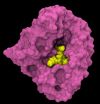(Press-News.org) The malaria parasite is particularly pernicious since it is built to develop resistance to treatments. The lack of new therapeutic approaches also contributes to the persistence of this global scourge. A study led by Didier Picard, professor at the Faculty of Sciences of the University of Geneva (UNIGE), Switzerland, describes a new class of molecules targeting the two problems at the same time. Using ultra sophisticated computerised modelling tools, the researchers were successful in identifying a type of candidate molecules toxic for the pathogen, but not for the infected human red blood cells. The study, led in collaboration with researchers from the Geneva-Lausanne School of Pharmacy (EPGL) and the University of Basel, has been published in the Journal of Medicinal Chemistry.
The most severe form of malaria is caused by infection with Plasmodium falciparum. The eradication of this parasite is even more difficult as it becomes resistant to treatments. The group led by Didier Picard, professor of biology at the Faculty of Sciences of UNIGE, Switzerland, is closely interested in the protein Heat Shock Protein 90 (HSP90), which plays a central role for several factors involved in the life cycle, survival and resistance of the pathogen.
Modelling the target-protein of the Plasmodium
Expressed in organisms as diverse as bacteria and mammal cells, HSP90 acts as a "chaperone", by helping other proteins during both normal and stressful periods. In the Plasmodium, HSP90 protects parasitic proteins during high fevers triggered by its presence. The chaperone also participates in the maturation of the pathogen in human red blood cells. "Our goal was to determine if there was a difference between the human form and the parasitic form of HSP90 that we could exploit for therapeutic purposes", explains Tai Wang, a PhD student at the Department of Cell Biology of UNIGE.
The PhD student used ultra-sophisticated computerised modelling tools to characterise the various tridimensional conformations of the parasite's HSP90. "The human chaperone harbours a "pocket" that binds molecules known to inhibit its activity. I compared it with that of the Plasmodium, hoping to find a difference which could be targeted by a specific inhibitor, but didn't," reported the researcher.
A screening performed entirely in silico
By studying the HSP90 of the pathogen from every possible angle, Tai Wang discovered another pocket capable of binding inhibitory substances, completely absent in its human alter ego. Using a supercomputer, he performed the screening of a virtual library containing more than a million chemical compounds while retaining those that could fit in this pocket. This screening in silico led him to select five candidates.
These experiments were then completed by a "real time" modelling technique. "The simulations were conducted to analyse the dynamics of interaction between the HSP90 and the candidates, leading to the discovery of inhibitors which interact specifically with the Plasmodium falciparum chaperone".
The molecules were then tested in vitro in different systems. The biologists demonstrated in particular the toxicity of those inhibitors on Plasmodium falciparum cultures, in doses sufficient to kill the parasites without affecting the infected red blood cells.
"These recently patented molecules are part of a group of compounds related to the 7-azaindoles, which exclusively bind the HSP90 of the parasite, but not the human form. The next step will be to fine-tune them in order to perform clinical tests," concluded Didier Picard.
INFORMATION: END
A tailor made molecule against malaria
A team at the University of Geneva, Switzerland, discovers the Achilles heel of the Plasmodium and aims a molecular arrow to destroy it
2014-03-12
ELSE PRESS RELEASES FROM THIS DATE:
Back surgery offers long-term societal benefits, according to new study
2014-03-12
Rosemont, Ill – Annually, more than 10 million people experience back pain in the United States. More than 200,000 of these patients undergo surgery to alleviate pain due to a herniated disc. Surgery to remove the disc has been found to be an effective way to improve these patients' quality of life in cases where conservative treatment is ineffective, but until now, little was known about the societal benefits of surgery and workplace productivity in particular. A new study uncovered that the estimated average annual earnings of working patients who undergo surgery are ...
Infection is the leading cause of failed prosthetic knee joints
2014-03-12
NEW ORLEANS─The number of total knee replacement (TKR) procedures continues to climb, as does the number of revision total knee replacement (RTKR) surgeries. In the study, "The Epidemiology of Revision Total Knee Arthroplasty in the United States," presented today at the 2014 Annual Meeting of the American Academy of Orthopaedic Surgeons (AAOS), researchers used the Nationwide Inpatient Sample (NIS) to evaluate the cause of knee failure for 301,718 revision RTKR surgeries performed between 2005 and 2010.
Revision surgeries were more common in women (58 percent) ...
Theoretical analysis of patterns formed on the ancient Damascus blades
2014-03-12
Blacksmiths and metallurgists in the West have been puzzled for centuries as to how the unique patterns on the famous Damascus steel blades were formed. Different mechanisms for the formation of the patterns and many methods for making the swords have been suggested and attempted, but none has produced blades with patterns matching those of the Damascus swords in the museums. The debate over the mechanism of formation of the Damascus patterns is still ongoing today. Using modern metallurgical computational software (Thermo-Calc, Stockholm, Sweden), Professor Haiwen Luo ...
Liver transplant may arrest neurological damage in a rare and progressive form of autism
2014-03-12
A patient with a rare metabolic disease that causes liver failure and autistic behavior experienced significant improvements in both her physical and mental health after receiving a liver transplant, according to a new case report published in the American Journal of Transplantation. The report's findings suggest an unexpected link between metabolic conditions and some forms of autism, and they point to the importance of a healthy liver for normal brain function.
Lathosterolosis, a rare disease caused by a defect in cholesterol synthesis, is characterized by multiple congenital ...
Dingo poisoning should be stopped to protect native Australian mammals
2014-03-12
Poisoning of dingoes - the top predators in the Australian bush - has a deleterious effect on small native mammals such as marsupial mice, bandicoots and native rodents, a UNSW-led study shows.
The research, in forested National Parks in NSW, found that loss of dingoes after baiting is associated with greater activity by foxes, which prey on small marsupials and native rodents.
As well, the number of kangaroos and wallabies increases when dingoes, also known as wild dogs, disappear. Grazing by these herbivores reduces the density of the understorey vegetation in which ...
New prognostic test for breast cancer could improve patient treatment
2014-03-12
A study by researchers in Nottingham has developed a new clinical test for breast cancer which aims to improve patient treatment.
The Nottingham Prognostic Index Plus (NPI+) could be available to patients within two years.
The findings, published in the British Journal of Cancer today, could significantly improve the way in which breast cancer patients are treated by giving clinicians more detailed information about a patient's breast cancer type and its likely behaviour, which will help them create a more personalised treatment plan.
The research, funded by the Medical ...
The first food web inside humans suggests potential new treatments for infection
2014-03-12
Imagine going to the doctor with an infection and being sent home with a course of drugs. Unknown to your doctor you actually have two infections. If you take the drugs will the other infection go away by itself? What if you take the drugs and the other infection gets worse? This quandary faces those treating patients with multiple infections.
A new study led by former University of Sheffield PhD student Dr Emily Griffiths, in collaboration with the universities of Edinburgh, Liverpool and Zürich, has taken a novel approach to understanding this problem, shedding light ...
Experts urge Chancellor to 'crack down on cheap drink' in next week's budget
2014-03-12
Writing on bmj.com, Katherine Brown, Director at the Institute of Alcohol Studies, says the UK chancellor should resist industry lobbying to scrap the annual rise in alcohol duty because "society simply can't afford for such cheap drink to get cheaper."
The duty escalator has been in place since 2008 to ensure that the price of alcohol rises at 2% above inflation. But a campaign by the wine and spirits industry is calling on the Chancellor to "Be Fair George!" and scrap the duty escalator for all alcohol in this year's budget.
Last year, following a similar campaign ...
Nicotine patches do not appear to help pregnant smokers to quit
2014-03-12
Smoking during pregnancy increases the risk of adverse pregnancy and birth outcomes and may have long lasting effects in offspring.
In England, 26% of women smoke in the year before their pregnancy and 12% smoke through to delivery. The rate is similar or even higher in other high income countries.
Guidelines suggest adding nicotine replacement therapies (NRT) to behavioural smoking cessation support in pregnant smokers because of their excellent safety profile and proved effectiveness in other groups of smokers. However, there is a lack of good quality evidence on ...
Community action not enough to reduce problem drinking and related harms
2014-03-11
Implementation of community-based interventions alone is unlikely to be effective for reducing most alcohol-related harms and risky alcohol consumption, according to a study by Australian researchers published in this week's PLOS Medicine. Anthony Shakeshaft and colleagues from the National Drug and Alcohol Research Centre at UNSW (University of New South Wales), report that alcohol-related crime, road-traffic crashes, and hospital inpatient admissions did not differ between communities that did and did not implement community-based interventions.
The researchers reached ...
LAST 30 PRESS RELEASES:
Scientists discover why we know when to stop scratching an itch
A hidden reason inner ear cells die – and what it means for preventing hearing loss
Researchers discover how tuberculosis bacteria use a “stealth” mechanism to evade the immune system
New microscopy technique lets scientists see cells in unprecedented detail and color
Sometimes less is more: Scientists rethink how to pack medicine into tiny delivery capsules
Scientists build low-cost microscope to study living cells in zero gravity
The Biophysical Journal names Denis V. Titov the 2025 Paper of the Year-Early Career Investigator awardee
Scientists show how your body senses cold—and why menthol feels cool
Scientists deliver new molecule for getting DNA into cells
Study reveals insights about brain regions linked to OCD, informing potential treatments
Does ocean saltiness influence El Niño?
2026 Young Investigators: ONR celebrates new talent tackling warfighter challenges
Genetics help explain who gets the ‘telltale tingle’ from music, art and literature
Many Americans misunderstand medical aid in dying laws
Researchers publish landmark infectious disease study in ‘Science’
New NSF award supports innovative role-playing game approach to strengthening research security in academia
Kumar named to ACMA Emerging Leaders Program for 2026
AI language models could transform aquatic environmental risk assessment
New isotope tools reveal hidden pathways reshaping the global nitrogen cycle
Study reveals how antibiotic structure controls removal from water using biochar
Why chronic pain lasts longer in women: Immune cells offer clues
Toxic exposure creates epigenetic disease risk over 20 generations
More time spent on social media linked to steroid use intentions among boys and men
New study suggests a “kick it while it’s down” approach to cancer treatment could improve cure rates
Milken Institute, Ann Theodore Foundation launch new grant to support clinical trial for potential sarcoidosis treatment
New strategies boost effectiveness of CAR-NK therapy against cancer
Study: Adolescent cannabis use linked to doubling risk of psychotic and bipolar disorders
Invisible harms: drug-related deaths spike after hurricanes and tropical storms
Adolescent cannabis use and risk of psychotic, bipolar, depressive, and anxiety disorders
Anxiety, depression, and care barriers in adults with intellectual and developmental disabilities
[Press-News.org] A tailor made molecule against malariaA team at the University of Geneva, Switzerland, discovers the Achilles heel of the Plasmodium and aims a molecular arrow to destroy it



